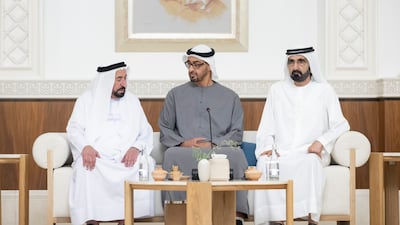“In 50 years, when we might have the last barrel of oil, the question is: when it is shipped abroad, will we be sad?” Sheikh Mohamed bin Zayed, President of the UAE and Ruler of Abu Dhabi, asked in 2015.
“If we are investing today in the right sectors, I can tell you we will celebrate at that moment.”
His message seven years ago at the World Government Summit in Dubai suggested he knew that the UAE’s continued prosperity would depend on a well-diversified economy.
He has since steered the UAE towards investment in and development of its non-oil economy to prepare the country for a post-oil era and is leading efforts to funnel oil wealth into sectors such as technology and manufacturing.
Abu Dhabi’s non-oil foreign trade rose by 15 per cent in one year to more than Dh61.5 billion ($16.7bn) in the first quarter of 2022.
In March, Dr Thani Al Zeyoudi, Minister of State for Foreign Trade, said the country’s non-oil trade had totalled Dh16.1 trillion in the past 10 years as the UAE sped up work to reduce its reliance on hydrocarbons.
In 2018, Sheikh Mohamed announced a Dh50bn stimulus package for Abu Dhabi.
It focused on growing the non-oil economy, attracting and supporting start-ups and small businesses, and spurring innovation through research and development.
The Ghadan 21 initiative, which had the overarching aim of reducing reliance on fossil fuels, stressed the importance of supporting the development of the local economy and creating jobs in Abu Dhabi.
The Abu Dhabi Accelerators and Advanced Industries Council, called Ghadan, helps to attract and support technology and investment both locally and in the region.
The UAE, which has the world’s sixth-largest oil and gas reserves, has also invested in other sources of energy, building the nuclear plant at Al Barakah and developing hydrogen as a fuel.
The country has launched a net zero by 2050 strategy with new investments worth Dh600bn planned in clean and renewable energy sources over the next three decades.
By the middle of the century, it aims to double the contribution of clean energy to its power mix to 50 per cent. The country’s economy is also evolving, with artificial intelligence and other technology being used to reduce its reliance on oil exports.
As the UAE also develops to become a knowledge-based economy, the government is placing a greater emphasis on careers focused on science, technology, engineering and mathematics, the so-called Stem subjects.
The government, as well as entities such as Mubadala Investment Company, have continued to encourage Emirati talent to pursue careers in Stem subjects, which essentially are the building blocks for economic diversification.
Mubadala, in partnership with Abu Dhabi Education Council, has awarded scholarships to support Emirati students’ pursuit of undergraduate degrees in Stem subjects. Working with Adec, the company also helped steer the government school curriculum in this direction and to deliver Stem-related after-school programmes.
Sheikh Mohamed bin Zayed’s life - In Pictures
The UAE, the Arab world’s second-largest economy, plans to increase the contribution of the industrial sector to its gross domestic product in the next 10 years to create jobs and attract investment.
Last year, it announced Operation 300bn, which aims to more than double the contribution of the industrial sector to economic output to Dh300bn by 2031, from Dh133bn in March 2021. It also seeks to support 13,500 small and medium enterprises over the next decade.
This helped the country’s industrial exports to record a “historic rise” to about Dh120bn last year as 220 factories opened in the Emirates, the Ministry of Industry and Advanced Technology said.
The UAE also launched an in-country value programme as part of the government’s Projects of the 50 initiative, which aims to boost the country’s industrial sector.
The ICV programme aims to boost the growth of UAE-based industries by redirecting 50 per cent of government spending on procurements and tender contracts into the national economy by 2031.
It was designed to stimulate demand for local products and services, and to encourage local manufacturers to diversify and attract foreign direct investment in the domestic industrial sector, with the aim of boosting economic growth and supporting local industries by redirecting higher portions of public spending into the national economy.
The national ICV programme has circulated Dh41bn back into the local market, promoting local companies, Dr Sultan Al Jaber, Minister of Industry and Advanced Technology, said. About 45 public entities and 13 major national institutions and companies have joined the initiative.
The Fourth Industrial Revolution Programme was also launched last year. Known as UAE Industry 4.0, this initiative is to help manufacturers to adopt digital technology such as artificial intelligence, sensors, robotics and the Internet of Things.
Emirates Global Aluminium is the UAE’s biggest industry conglomerate outside oil and gas. One of the world’s largest aluminium producers, EGA is owned equally by Mubadala Investment Company and Investment Corporation of Dubai.
The Emirates is also forging Comprehensive Economic Partnership Agreements with many countries to boost trade and diversify its economy.
This year, the UAE signed a Cepa deal with India. The agreement, which took effect on May 1, is expected to boost non-oil trade between the nations to $100bn in five years from $60bn now.
A similar deal with Indonesia is expected to triple two-way trade in the next four years from $2.5bn in 2020.
A Cepa agreement with South Korea, which is expected to be finalised by the end of 2022, aims to enhance the economic partnership between the countries to a minimum of $20bn in the next three to five years.
The UAE has also launched trade negotiations with partners including Turkey, Israel, Georgia and the Philippines, among others.
It plans to sign 27 Cepa deals in total as it looks to boost trade and foreign direct investment, Abdulla bin Touq, Minister of Economy, said at the Annual Investment Meeting in Dubai.






























